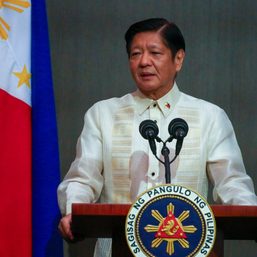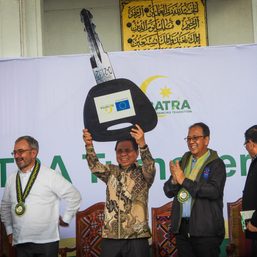SUMMARY
This is AI generated summarization, which may have errors. For context, always refer to the full article.
![[OPINION] A challenge to Marcos government and MILF](https://www.rappler.com/tachyon/2024/03/TL-Challenge-Marcos-MILF-March-25-2024.jpg)
On the 10th anniversary of the signing of the Comprehensive Agreement on the Bangsamoro (CAB), there are reasons to celebrate.
First, the Bangsamoro Autonomous Region in Muslim Mindanao (BARMM) has been established pursuant to its Organic Law and the regional legislations that provide for the mechanisms and the policies for its operations are in place.
Second, the intergovernmental relations mechanisms to coordinate and resolve policy disputes between Manila and the BARMM government are operational.
Third, fiscal autonomy of BARMM, with the block grant, has been at its highest level since the establishment of regional autonomy in 1977.
Fourth, the first regional parliamentary elections are on track to be held in May 2025 with no less than 23 political groups/parties monitored to be preparing to be registered and accredited in order that they can field candidates in the regional elections. The May 2025 elections is the conclusion of the political transition as it finally establishes the regional Parliamentary government.
There are two critical developments that highlight the difficult challenges in the implementation of the political track of the CAB.
Legal challenges
The first is the petition in the Supreme Court questioning the constitutionality of the Bangsamoro Electoral Code (BEC) and the Bangsamoro Local Governance Code (BLGC) as well as the petition of the Province of Sulu questioning the constitutionality of the Parliamentary system in the BARMM which remains pending in the Supreme Court to date.
The second critical development is the approval of BTA Resolution no. 521, which expresses the sense of the BARMM Parliament, to support charter change to resolve constitutional Issues in the implementation of the Comprehensive Agreement on the Bangsamoro.
The three pending petitions in the Supreme Court raise the same basic legal argument that BARMM’s autonomy is located within the Philippine unitary system of government and regional laws must always be consistent with the Constitution and national laws. Thus, regional laws are valid only insofar as they do not violate the Constitution, the BOL and other national laws.
BTA Resolution no, 521 is calling for amending the Constitution to fully implement the terms of the CAB on power sharing – the exclusive, reserve and concurrent powers of BARMM and the national government; the Shariah Justice system; policing; supervision and control of the regional government over its local government units; delineation of powers of the Constitutional bodies relative to the regional government and qualification of the Chief Minister.
The petitions in the Supreme Court and BTA resolution no. 521 are challenging the view that the Philippine Constitution has flexibilities to accommodate the terms of the CAB.
The “Constitution as flexible” argument has in fact long been debunked in the legislation of the BOL. The heart of any autonomy arrangement is clear delineation of powers between the center and the autonomous territory. In the legislation of the BOL, Congress has found that vesting the BARMM with exclusive powers is inconsistent with the Constitution, thus the classification of powers in the CAB – exclusive powers for the BARMM, reserve powers for the national government and concurrent powers for both national and regional government, was not adopted in the BOL.
Exit agreement
With BTA Resolution 521, charter amendments in so far as the MILF-led BTA is concerned, is necessary nonetheless, whichever way the Supreme Court decides on these cases.
If charter change is required for the CAB to be fully implemented, what is the prospect for the government and the MILF signing an exit agreement before the regional elections in May 2025?
There is high expectations for signing an exit agreement but we need to reexamine what exit agreement means in relation to the political track of the CAB.
The CAB as a negotiated political agreement is not self-executing and must be translated into a law to be enforceable.That law is the Bangsamoro Organic Law which was approved in a plebiscite. The President, under our system of separation of powers, cannot bind Congress and the judiciary on the terms of the CAB. In particular, the President, as ruled by the Supreme Court in the MOA-AD case, cannot bind the other branches of government in changing the constitution. Congress, on the other hand, must insure that the BOL is legislated in line with the Constitution.
In this context, how could the parties conclude an agreement to move the peace process forward while at the same time keeping in play the agreed political components of the CAB?
Here lies the resilience of the CAB and the foresight and innovative thinking of the GPH and MILF negotiators. The CAB provides that the Transition Commission shall work on proposals to amend the Philippine Constitution for the purpose of accommodating and entrenching in the Constitution the agreement of the parties whenever necessary without derogating from any prior peace agreement.
Role of Transition Commission
By this provision, the GPH and the MILF agreed on a process in the event the terms of the political components of the CAB cannot be implemented because of constitutional constraints. As early as the second Bangsamoro Transition Commission, proposals to amend the Constitution to implement the terms of the CAB were submitted by the BTC to the Office of then President Duterte. BTA resolution 521 demonstrates the resolve of the MILF-led regional government in pushing for charter amendments to implement the CAB.
The CAB provides for the avenue for charter change to be proposed by the Transition Commission when needed. But the GPH is not obligated to undertake charter change because the Transition Commission can only propose but the President cannot guarantee charter change. On the other hand, the MILF can raise the unfulfilled terms of the CAB due to constitutional constraints as basis for not signing an exit agreement.
Then-president Duterte understood how the implementation of the CAB is constrained by the Constitution that in his inaugural address he has committed to implement all signed peace agreements with the Moro fronts but with the qualification “in step with legal and constitutional reforms”.
It is important to understand the dynamics of CAB, the BOL and the Philippine Constitution in relation to the exit agreement. By understanding these dynamics and the spirit of the CAB, the exit agreement with respect to the political track can be framed constructively.
Test for government, MILF
First, political institutions and public policies evolve. Just as peace is a process not a goal, state or institution building is incremental alongside the development of institutional capacities and structures, clarifying intergovernmental relations in multilevel government and strengthening public policies.
There are no quick fixes in building accountable and efficient institutions and public policies. Since it is a process not an end, state-building is not terminable. An exit agreement, I respectfully submit, is anathema to the evolving and incremental process of state and institution building.
Second, state-building is not a two-party affair but a democratic process that requires participation of all citizens. Just as the executive branch of the Philippine government cannot bind Congress and the voting citizens of the Philippines who will have to approve charter amendments in a plebiscite, the MILF that negotiated the CAB may not compromise the implementation of the political components of the CAB which have already gained constituents in Moro society.
Third, exit agreement in relation to the political track, means that the MILF has exited and abandoned the battlefield and have entered the democratic and parliamentary space as the arena for pushing their vision and aspirations for the Bangsamoro. An exit agreement is not applicable to the implementation of the political components of the CAB that are not self-executing but requires a political process to fulfill them.
In conclusion, with respect to the political track of the peace process, the success or failure of its implementation does not solely rest on the signing or non-signing of an exit agreement. The ultimate test is whether the GPH has demonstrated openness to consider the proposals for charter change to accommodate the terms of the CAB. And on the part of the MILF, whether it has effectively abandoned the armed struggle and has embraced the democratic and parliamentary space as the arena for pushing its ideals and aspirations. – Rappler.com
Benedicto Bacani is executive director of the Institute for Autonomy and Governance. He made these remarks on March 22 at a panel on domestic resilience and meaningful autonomy in the BARMM on the occasion of the 10th Anniversary of the Signing of the Comprehensive Agreement on the Bangsamoro, held in UP-Diliman.
Add a comment
How does this make you feel?
![[OPINION] Political parties must embody Bangsamoro people’s aspirations](https://www.rappler.com/tachyon/2024/03/imho-bangsamoro-embodiment-03212024.jpg?fit=449%2C449)

![[OPINION] Political parties must embody Bangsamoro people’s aspirations](https://www.rappler.com/tachyon/2024/03/imho-bangsamoro-embodiment-03212024.jpg?resize=257%2C257&crop_strategy=attention)
![[OPINION] A long and winding road to peace in Bangsamoro](https://www.rappler.com/tachyon/2023/05/TL-Long-winding-road-peace-bangsomoro-May-6-2023.jpg?resize=257%2C257&crop=281px%2C0px%2C720px%2C720px)




![[Just Saying] SONA 2024: Some disturbing points](https://www.rappler.com/tachyon/2024/07/TL-marcos-sona-points-july-23-2024.jpg?resize=257%2C257&crop=335px%2C0px%2C720px%2C720px)






There are no comments yet. Add your comment to start the conversation.